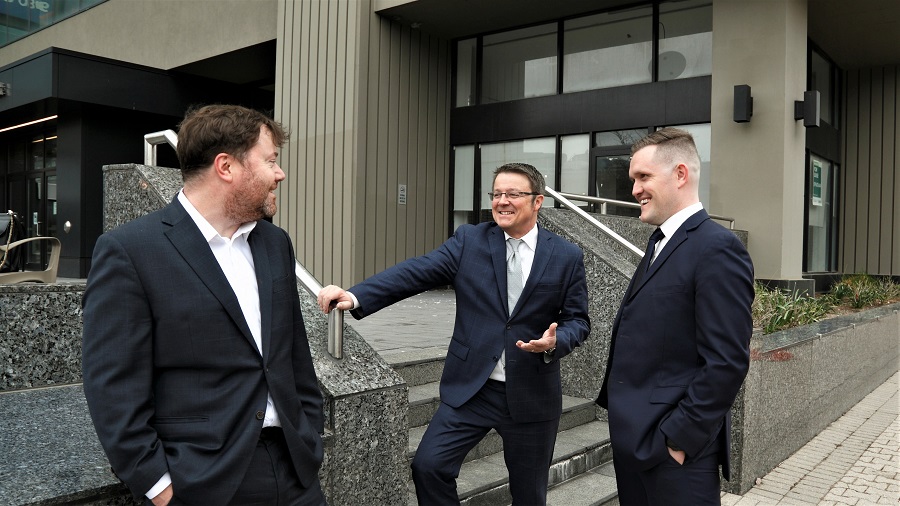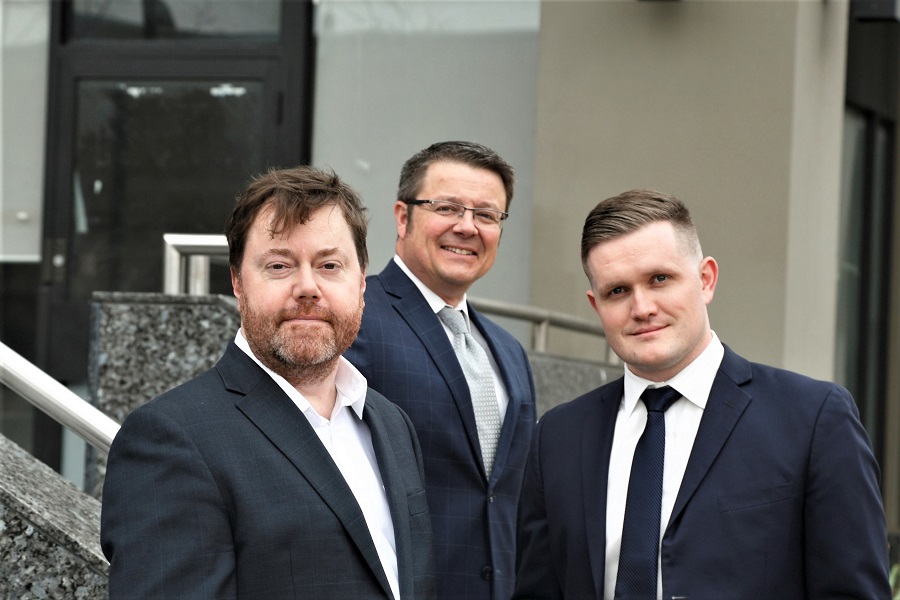Brave new world
If you think the pandemic redefined your career, consider the topsy-turvy realm of employment law
Photo: Lawyers Matt Dewar, Jason Beeho and Michael Lee of Duntrune Law
SO MUCH OF the experience of this pandemic has centred around work and labour. The workplace has been, for many Canadians, the Covid conflict point; the place where abstract debates about safety, social supports and the things we should owe each other in crisis times have become real.
Click here to view this story in magazine format
Suddenly, in March 2020, it was as if a crisis of Covid and a crisis of work arrived hand-in-hand.
And, for the most part, workplaces weren’t ready for it — nor were the country’s employment laws.
Story Continues Below
“It’s been a crazy time,” reflects employment lawyer Matt Dewar of Duntrune Law. “Holy smokes, nobody saw it coming. And when it came for employment lawyers, it came hard and fast.”
As it did with healthcare, the pandemic prompted successive work-issue waves, leaving employers and employees to sort out the messy and often contradictory business of labour amid a crisis. And as we look ahead to the post-pandemic environment, answers to a litany of questions are still taking shape.
“Holy smokes, nobody saw it coming. And when it came for employment lawyers, it came hard and fast” —Matt Dewar
“There’s three stages that we’re dealing with here,” says Dewar. The first: layoffs.
“When it hit in March 2020, every employer wanted to know whether they could reduce wages; could they fire people, could they lay them off,” he explains.
Just as that was happening, the government rolled out expansive aid programs, like CERB and CEWS, complicating things further. “We almost thought we were back in law school, looking up all these new programs,” jokes Dewar.
Then came vaccinations. “Vaccine policies, people refusing to get vaccinated — employers wanted to know if they could fire people or not, or if they could put them on unpaid leave,” says Dewar. “It shifted so quickly.”
Story Continues Below
Vaccines were a tricky, controversial and sensitive issue, especially as the science around variants, boosters and efficacy evolved on the fly, he says — like building the proverbial airplane while it’s in mid-flight.
And now, the third stage, where lawyers try to figure out how to make sense of legal obligations in a changed world.
“The third stage — what we’re in now — is the lawsuits,” Dewar says. People who had been laid off are now trying to sort out what kind of severance they’re owed, or if that layoff amounts to a constructive dismissal.
And then there’s hybrid and remote work to think about — and what about future waves? Masks? Boosters? Paid sick days? The list goes on, and without a clear and unambiguous legal path forward on all of it, it gets left to law firms like Duntrune, and lawyers like Dewar, to sort it out as best they can.

“We’re the lucky inheritors of 850 years of jurisprudence, where everything has been built on the day before and the day before that, and you have that ability to look back on what smarter people have said,” Dewar observes.
But Covid changed that. Nobody had really been planning for a pandemic, even if pandemics are a regular enough feature of human life (long memories and worst-case scenario planning, on the other hand, are not).
The main questions now, says Dewar, centre on what the modern workplace should look like and how it should operate. Remote work means employees are often spread across different jurisdictions, with slightly different labour laws. We’re also in an extremely tight labour market, where workers have access to — and are using — new types of leverage that didn’t exist in the labour market of the last few decades.
Story Continues Below
For example, if a company wants to bring their workers back to the office, how should they respond to the holdouts? What if, Dewar hypothesizes, a company “really wants to hire this new person, they’re the perfect candidate, but one of their absolute no-bend rules is that they want to work three days at home?”
Or, what if the lone holdout is “that person who has been with you for 25 years, knows all the ins and outs and has tons of institutional knowledge?”
For Dewar, it means we are entering a new era where trust between employer and employee is more important than ever, and where that trust will need to be rebuilt over time.
Story Continues Below
“A lot of the questions revolve around trust,” he says. “As always, the most important asset that an employer has are its employees and you need to look at each individual case; you can’t operate in a vacuum, you have to take a contextual approach.”
As Dewar suggests, there’s no one size fits all. But out of the back-and-forth may come clarity — and a renewed social contract as it relates to work.
“There’s going to be more tension coming,” he says. “But I think we’re going to see all new things.” ![]() Kieran Delamont
Kieran Delamont

